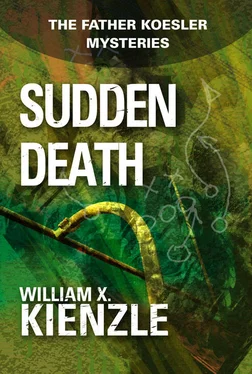William Kienzle - Sudden Death
Здесь есть возможность читать онлайн «William Kienzle - Sudden Death» весь текст электронной книги совершенно бесплатно (целиком полную версию без сокращений). В некоторых случаях можно слушать аудио, скачать через торрент в формате fb2 и присутствует краткое содержание. Жанр: Криминальный детектив, на английском языке. Описание произведения, (предисловие) а так же отзывы посетителей доступны на портале библиотеки ЛибКат.
- Название:Sudden Death
- Автор:
- Жанр:
- Год:неизвестен
- ISBN:нет данных
- Рейтинг книги:4 / 5. Голосов: 1
-
Избранное:Добавить в избранное
- Отзывы:
-
Ваша оценка:
- 80
- 1
- 2
- 3
- 4
- 5
Sudden Death: краткое содержание, описание и аннотация
Предлагаем к чтению аннотацию, описание, краткое содержание или предисловие (зависит от того, что написал сам автор книги «Sudden Death»). Если вы не нашли необходимую информацию о книге — напишите в комментариях, мы постараемся отыскать её.
Sudden Death — читать онлайн бесплатно полную книгу (весь текст) целиком
Ниже представлен текст книги, разбитый по страницам. Система сохранения места последней прочитанной страницы, позволяет с удобством читать онлайн бесплатно книгу «Sudden Death», без необходимости каждый раз заново искать на чём Вы остановились. Поставьте закладку, и сможете в любой момент перейти на страницу, на которой закончили чтение.
Интервал:
Закладка:
Long before the ten years had passed, most of their classmates had rationalized their way around that pledge.
After eight years as a priest, Koesler had been appointed editor-in-chief of the archdiocesan newspaper, the Detroit Catholic. In his new role, Koesler found it necessary-or thought he did-to join his new colleagues in newsgathering, reporting, commenting, and drinking. If that was the bad news, the good news was that Koesler soon learned, through the school of honest mistakes, the necessity for moderation.
In any case, after the allotted ten-year period, McNiff presented himself to Koesler for his baptism in hard liquor. As was the case in all McNiff s more important endeavors, he imbued the occasion of his first serious drink with a melodramatic ambiance. One could, in one’s imagination, hear the roll of kettledrums.
McNiff, solemnly announcing that he was placing his immediate alcoholic future in Koesler’s trusted hands, warned, “You ain’t gonna play fool-around with me!”
Koesler assured him that no horseplay would mar this sacred moment. He repaired to his inner sanctum, where he prepared McNiff’s first drink. He dropped several ice cubes in the glass, poured in a few drops of Scotch, and filled the considerable remaining space with water. Technically, it was an alcoholic drink-the lightest McNiff would ever taste.
The presentation was suitably solemn. McNiff sat pondering his initiation into the realm of serious drinkers. He once again extracted Koesler’s assurance that there had been no hanky-panky in the drink’s preparation.
McNiff stirred the ice with his index finger; for years, he’d been watching confirmed drinkers do that. Finally, he took a sip, rolled it around his palate, swallowed it, looked up brightly, and commented, “That wasn’t so bad.”
Now, as Koesler watched McNiff stir his martini, a drink considerably stronger than his first, the long-ago scene flooded his memory.
“Besides,” McNiff picked up the thread of their conversation, “any offensive chance we had in that game was shot when Hunsinger got thrown out.”
“Oh, c’mon, Pat; the Cougars’ entire offense isn’t tied up in one player.”
McNiff nodded gravely. “Who does Bobby Cobb go to when we need the big play? Nine out of ten times,” he answered his own question, “it’s the Hun. If he’d been in the game at the end, I’d almost go along with your crazy pass play.”
Koesler smiled. “For you, that’s a real act of faith.”
“The Hun can get the job done. He’s been doing it for years. I don’t know what we’re going to do when the Hun hangs it up, as, inevitably, he must.”
“There’ll be someone else, Pat. There always is.”
“Who’s the Hun’s backup now?”
“Hoffer. Kit Hoffer.”
“Yeah, that’s the guy. What’d he do today? One incompleted pass!”
“The ball was thrown behind him! Good grief, what do you expect!”
“The Hun would have caught it.”
“Oh, sure, and then made it disappear.”
“You mark my words, Bobby: Kit Hoffer is never going to fill the Hun’s shoes. And remember, you heard it here.”
“Please, Pat,” Koesler said lightheartedly, “don’t be so hard on Hoffer. He’s one of my parishioners.”
There was that moment of genuine surprise that, from long association, Koesler recognized.
“I didn’t know that.”
“He moved in earlier this year, when he won a spot on the team.”
“No kidding! You got a pro football player in your parish!” McNiff s childlike awe was manifest.
“Not only is he a parishioner; he got me involved in a Bible discussion group.”
“A Bible discussion group! What happened? Did you find a spare moment that wasn’t filled in with meetings, Masses, or paperwork?”
The waitress brought their salad. Koesler noticed for the first time her clinging black dress with its fetching decolletage.
He ordered a bottle of Blue Nun. He had never taken enough interest in wines to become an oenologist. Someone had once mentioned that Blue Nun could accompany meat, fish-anything. Since he was having meat and McNiff fish, he quickly decided on the easiest solution. Besides, for two men in clerical suit and roman collar, Blue Nun had a nice ring.
He could not help reflecting on McNiff’ s questions. Koesler had always considered the priesthood a hard-working, busy profession. But how priestly occupation, as well as the world, had changed since they had been ordained in the mid-fifties! Then, Catholicism had found itself in the middle of a rhythm-only baby boom, campaigns against steady dating and a nefarious new publication called Playboy; the beginning of what might become either the newest or the ultimate technological explosion; and the last throes of a climate in which “Father” knew best.
How things had changed in thirty years!
Now, few could remember why steady dating had been a problem. Teenagers of the fifties had passed along that victory, as well as the triumph of their music, to their children. If steady dating was no longer a problem, undesired pregnancies, as well as abortions, the occasional consequences of steady dating, now were.
Catholics, by and large, had settled the issue of family planning to the satisfaction of their own “informed” consciences. Almost the only Catholics who still found a problem with most means of birth control were a few priests, many bishops, and, of course, the Pope. With almost all these gentlemen, the problem remained no more than theoretical.
Playboy, despite all Catholic efforts to have it removed from store shelves, was alive and well. The magazine had spawned so many imitators that had, in turn, so strained the limits of decency that the mother of them all was now quite bland by comparison.
Word processors were ubiquitous. Long ago, they had put the final nail into the coffin of that noble instrument, the Linotype machine. And now so many children had computers that these electronic wonders had replaced books, comic books, Big-Little Books, television, and, of course, outdoor exercise. The nuclear club had grown by the year. So much so that most first-world countries as well as some second-world countries had the capability to at least initiate the final holocaust. And in all this technological race there was no semblance of a contemplative balance. Reflecting on the present state of affairs, Koesler concluded that the seven last words of Western Civilization might well be, We Have the Technology to Do It.
Finally, as far as Koesler was concerned, the day of “Father”-in the sense of the good old parish priest-knowing best was irretrievably gone. There had been a time, spanning centuries, when the local priest had been the best-, sometimes the only, educated person in an area. The serfs worked while the monks studied. Ethnic immigrants to the USA clustered in their ghettos around their priests. Even in the 1950s, the parish priest had been the general practitioner who instructed, counseled, mediated, arbitrated, processed, and at times acted as an employment agent. Now, in this age of specialization, Catholics, like nearly everyone else, took their problems to specialists. The priest as amateur marriage counselor and seat-of-the-pants psychologist gave way to the professional.
Koesler stabbed a piece of lettuce and dabbed it in the house dressing. “As far as our time being overscheduled with meetings and Masses, I’ll give you that one. God knows, between parochial and diocesan meetings, there’s not an awful lot of time left over. And with the priest shortage, each of us has more Masses to say than ever before. We used to be able to at least take turns with all the weddings and funerals. Now, there’s hardly anyone around to take a turn.
“But the other thing you mentioned, Pat, the paperwork, the administration; I think we can get rid of a hell of a lot of that.”
Читать дальшеИнтервал:
Закладка:
Похожие книги на «Sudden Death»
Представляем Вашему вниманию похожие книги на «Sudden Death» списком для выбора. Мы отобрали схожую по названию и смыслу литературу в надежде предоставить читателям больше вариантов отыскать новые, интересные, ещё непрочитанные произведения.
Обсуждение, отзывы о книге «Sudden Death» и просто собственные мнения читателей. Оставьте ваши комментарии, напишите, что Вы думаете о произведении, его смысле или главных героях. Укажите что конкретно понравилось, а что нет, и почему Вы так считаете.












